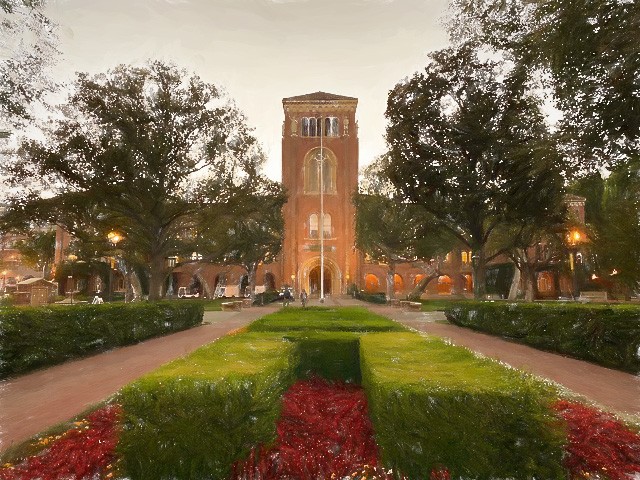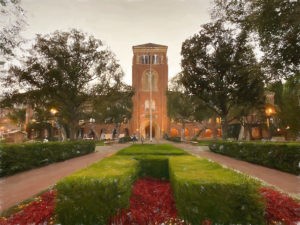
The website of the University of Southern California proudly lists a multitude of “Student Equity and Inclusion Programs” which are designed to create “a sense of belonging” for the diverse array of students at USC. But when a Professor of Communications at the university attempted to educate his students about Chinese linguistic patterns, explaining the meaning of a Chinese word that—to the uneducated ear of American students—sounded similar to the N-word, he was reported as a racist and suspended from teaching the class.
Greg Patton is a professor at USC’s Marshall School of Business and an “expert in communication, interpersonal and leadership effectiveness.” During the fall 2020 semester, Patton taught an online class during which he spoke about the use of “filler words” in the speech of various languages.
“If you have a lot of ‘ums and errs,’ this is culturally specific, so based on your native language,” the professor explained. “Like in China, the common word is ‘that, that, that.’ So in China it might be ‘nèi ge, nèi ge, nèi ge.’”
To a native Chinese speaker, the word sounds nothing like the American racial slur. Patton himself has worked in China although is not a fluent speaker of Chinese. Despite the crystal-clear context of Patton’s example, and his status as an expert in communications, a number of African-American students were so offended that they sent a letter to the Marshall School of Business Dean Geoffrey Garrett accusing Patton of racial insensitivity and stating that he was unfit to teach the class.
“The way we heard it in class was indicative of a much more hurtful word with tremendous implications for the Black community,” stated the students’ letter. “There are over 10,000 characters in the Chinese written language and to use this phrase, a clear synonym with this derogatory N-Word term, is hurtful and unacceptable to our USC Marshall community. The negligence and disregard displayed by our professor was very clear in today’s class.” The letter was signed “Black M.B.A. Candidates c/o 2022.”
Incredibly, instead of explaining to the complaining students that they were displaying cultural insensitivity towards the Chinese people and language, USC chose to uphold their absurd and racist complaint towards the professor for exposing them to an example of Chinese speech. Dean Garrett wrote back to the complaining students and explained that Professor Patton would be removed as the instructor of the course, effective immediately.
“It is simply unacceptable for faculty to use words in class that can marginalize, hurt and harm the psychological safety of our students,” Garrett wrote. He claimed that Patton had “repeated several times a Chinese word that sounds very similar to a vile racial slur in English. Understandably, this caused great pain and upset among students, and for that I am deeply sorry.”
Following an investigation, USC’s Office of Equity, Equal Opportunity and Title IX eventually found that Professor Patton’s Chinese language example “did not violate the university’s policy,” but student organizations on campus continued to press for repercussions and the chilling ramifications on academic freedom were evident both inside and beyond the university walls.
Professor Patton is not alone among USC faculty for being targeted for legitimate and constitutional expression. Dr. James Moore, a professor of engineering at USC, hung a “Thin Blue Line” flag (a version of the American flag with a blue stripe to show support for police officers) on the door of his office at the start of the 2021 academic year. As word of the flag spread, students demanded that it be taken down, calling it “an inappropriate and unnecessary symbol” and urging the university to “do something about Professor Moore because this is not the first controversial thing he’s done.”
Then a dean from the School of Engineering called him to ask that he move the flag to inside his office—a request that Moore discovered came from the central campus administration
Moore politely refused to remove the flag, stating in an interview that he “wanted to communicate to conservative students on campus that their point of view was recognized, because you wouldn’t know it from the messaging they receive in this organization.” He also wanted to counter the myth that “black lives are at risk from the police” because it “is not borne out in the data.”
Unlike with Professor Patton, the USC administration did not go so far as to suspend Moore, but it isn’t hard to imagine that a less established professor might have been cowed by the administration’s request to censor his views.
It is not only faculty who are subject to the fascist whims of the USC administration. In 2018, USC made headlines when it banned student journalists from covering a public forum to solicit feedback on the search for a new college president. The school had claimed that participants in the forum would not “feel comfortable” if they were “recorded or reported on.” While student journalists were allowed to attend the forum, they were barred from taking notes, quoting speakers, or recording the event.
Only after public outrage and the intervention of the Foundation for Individual Rights and Expression (FIRE), a non-profit organization that defends free speech and free thought in American society, did USC admit their failure. “Student media reporters were mistakenly told by a University Communications staff person that they were not permitted to report from inside the session,” Rick Caruso, chairman of the USC Board of Trustees, wrote in a campus-wide email.
FIRE has awarded USC a “yellow light” ranking for having “at least one ambiguous policy that too easily encourages administrative abuse and arbitrary application.”
